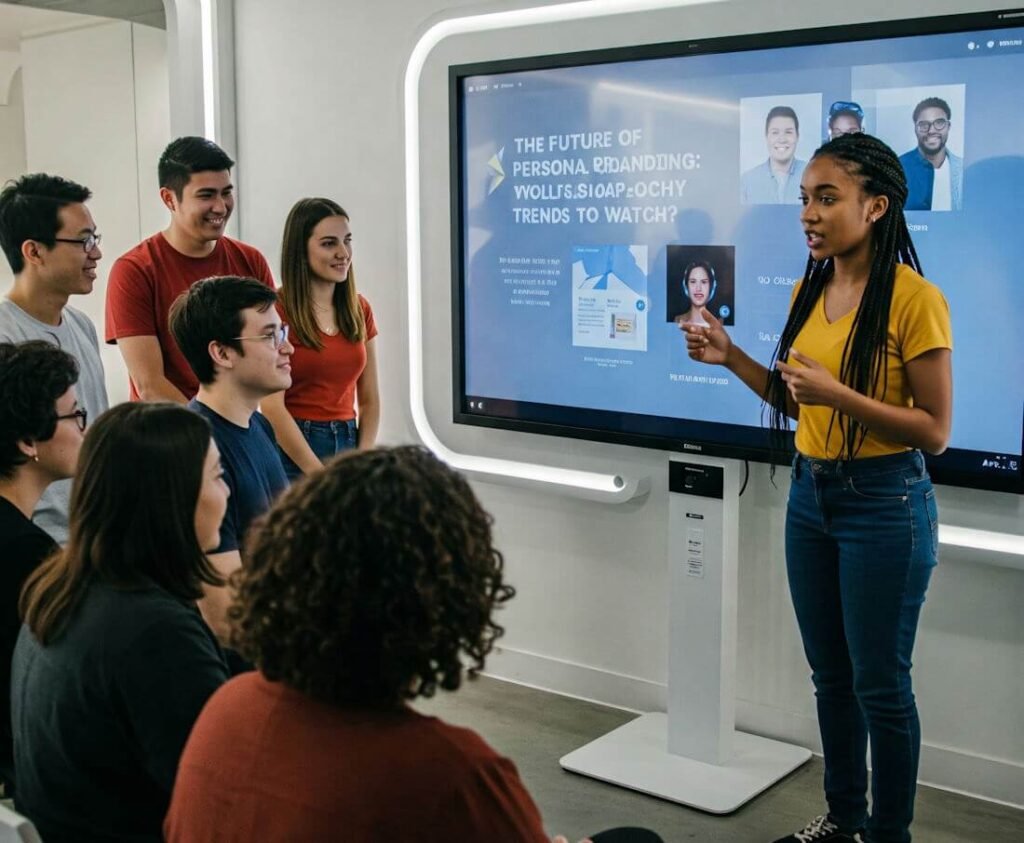In today’s fast-paced digital landscape, the concept of personal branding has emerged as a critical factor for professional success and visibility. Personal branding refers to the process of creating a unique identity that conveys one’s values, skills, and experiences. This identity shapes how individuals are perceived in their respective industries or fields. Contrary to common belief, personal branding is not exclusively reserved for celebrities or social media influencers; it is a valuable tool for anyone keen on establishing a professional online presence.
The importance of personal branding cannot be overstated. A well-crafted personal brand not only differentiates an individual from their peers but also enhances credibility and trust among potential clients, employers, and collaborators. By effectively communicating their expertise and personality, individuals can better navigate the complexities of career advancement, job searching, and professional networking in the digital age. Additionally, a strong personal brand can open doors to new opportunities as it allows individuals to showcase their talents and accomplishments effectively.
As we continue to witness the evolution of digital platforms and social media, the landscape of personal branding is undergoing significant changes. Technology is not just facilitating the creation of personal brands; it is also transforming how individuals engage with their audience. Hence, adapting to these changes is essential for anyone looking to maintain relevance in their field. As we delve into the forthcoming trends that will shape personal branding in the near future, understanding the foundational aspects of this concept will provide valuable context. It prepares individuals to leverage their unique identities effectively and to stay ahead in an increasingly competitive environment.
The Rise of Authenticity
In an era dominated by digital interactions, the concept of authenticity has emerged as a pivotal aspect of successful personal branding. Today’s audiences, inundated with polished and curated images, are increasingly drawn to figures who embody sincerity and transparency. The rise of social media platforms has enabled individuals to showcase their true selves, cultivating connections rooted in genuine narratives rather than superficial representations.
Authenticity resonates with audiences seeking relatable figures who share their experiences and challenges. This shift has encouraged personal brands to emphasize vulnerability in storytelling, allowing individuals to present not just their triumphs but also their struggles. This approach helps demystify the often glamorized world of personal branding, encouraging followers to engage with individuals on a deeper emotional level. Vulnerability is powerful; it fosters trust and loyalty, as it portrays the storyteller as more than just a façade but rather a human being navigating life’s complexities.
The diminishing appeal of overly polished personas further underscores the importance of authenticity in personal branding. Audiences are increasingly discerning; they can recognize when someone is not being genuine. As a result, brands that prioritize authenticity stand out, leading to stronger connections with their audience. It is no longer sufficient to project an idealized image; instead, showcasing one’s true self and embracing imperfections can enhance relatability and foster a sense of belonging among followers.
As individuals and brands navigate the complexities of personal branding, the trend towards authenticity is expected to grow stronger. Ensuring that communications remain genuine and transparent will be essential for anyone aiming to establish a meaningful personal brand in the rapidly evolving digital landscape.
The Impact of Emerging Technologies
Advancements in technology are playing a pivotal role in transforming personal branding. Innovations such as artificial intelligence (AI), virtual reality (VR), and augmented reality (AR) are creating new paradigms for how individuals craft and communicate their personal brands. AI, for instance, enhances branding efforts by providing tools for analysis and engagement. Through sophisticated algorithms, AI can analyze a person’s online presence, offering insights that help refine their branding strategies. This means individuals can focus on elements that resonate more with their target audience, thereby maximizing their visibility and relevance in a crowded digital space.
Virtual reality and augmented reality have also emerged as powerful instruments for personal branding. In a world where experiences increasingly define connections, these technologies enable users to create immersive experiences that showcase their expertise or creativity. For example, a professional can use VR to create an interactive portfolio that allows potential clients or employers to engage with their work in a more profound way. Similarly, AR offers opportunities for individuals to augment physical spaces with digital content that reflects their branding, whether it be through signs, artwork, or interactive experiences that attract attention.
Additionally, the role of social media algorithms cannot be overlooked. Platforms are continually evolving their algorithms to prioritize content that fosters engagement. As such, individuals need to stay informed about changes to these algorithms to effectively reach their audience. To enhance visibility, a personal brand must adapt to the nuances of these algorithms, leveraging timely content and consistent engagement strategies to remain relevant. Furthermore, new social media platforms tailored specifically for personal branding are continually emerging, providing individuals with alternative avenues to market themselves. In this dynamic landscape, keeping abreast of technological developments is essential in shaping an effective personal brand.
Personal Branding in the Age of Video Content
In recent years, video content has surged in popularity, profoundly influencing the landscape of personal branding. As audiences increasingly gravitate towards visual media, professionals are adopting video as a pivotal tool for enhancing their personal brand. Platforms such as TikTok and Instagram Reels have pioneered a trend towards short-form videos, making content creation more accessible than ever. These platforms not only entertain but serve as formidable avenues for individuals to convey their unique narratives and establish authentic connections with their audience.
Live streaming has also emerged as a crucial aspect of personal branding strategies. This format allows individuals to engage in real-time interactions with viewers, fostering a sense of immediacy and connection that pre-recorded videos cannot replicate. By utilizing platforms such as Twitch, YouTube Live, and even social media platforms like Facebook and Instagram, brands can showcase their personality and expertise while participating in a two-way conversation with their audience. This level of engagement can enhance trust and solidify a personal brand’s authenticity.
Additionally, the rise of video resumes signifies a notable shift in how professionals present themselves to potential employers. This innovative approach allows candidates to showcase their skills, personality, and communication abilities through a dynamic medium. Video resumes can leave a longer-lasting impression compared to traditional formats, ultimately giving a competitive edge to those who adopt this trend. As the digital landscape continues to evolve, individuals need to stay current with these changes and integrate video strategically into their personal branding efforts.
To effectively leverage video for personal branding, a clear understanding of one’s target audience is essential. By tailoring content that resonates with viewers while remaining authentic, individuals can harness the power of video to build and promote a strong personal brand in an increasingly competitive environment.
The Role of Networking and Community Building
In today’s digital era, networking has taken on a new dimension, significantly impacting personal branding. With the advent of social media and online forums, individuals have the unique opportunity to cultivate authentic relationships that transcend geographical boundaries. The evolution of networking is characterized not merely by the act of connecting with others, but by fostering meaningful relationships that contribute to personal and professional growth. This shift towards personalized networking emphasizes the importance of engagement over quantity; it advocates for building genuine connections within specific communities that resonate with an individual’s brand.
Personal branding now requires individuals to strategically integrate themselves into relevant communities. These networks serve as platforms for sharing knowledge, experiences, and skills, creating an environment conducive to mutual support and growth. Engaging in dialogue on forums dedicated to specific areas of interest allows personal brands to emerge organically, demonstrating expertise in a given field while simultaneously enhancing visibility. Moreover, through these interactions, one can identify synergies with other professionals that may lead to collaborations, mentorships, or partnerships, all of which significantly contribute to personal branding efforts.
Furthermore, as networking evolves, the utilization of online platforms has proven essential in this regard. Professional networking sites, such as LinkedIn, offer tools for individuals to highlight their strengths while connecting with industry peers. These platforms not only facilitate introductions but also provide opportunities for content sharing, discussions, and thought leadership. In essence, individuals leveraging these digital tools can expand their influence and establish themselves as authorities within their niche. Networking and community building, therefore, are becoming intricately linked to personal branding, with an emphasis on the quality of relationships and the authenticity of engagement guiding the way forward.
Influencer Collaboration: A New Branding Strategy
Over the past few years, the landscape of personal branding has dramatically evolved, leading to the rise of influencer collaboration as a potent strategy for brand enhancement. By partnering with well-known influencers, individuals can significantly amplify their personal brand reach and visibility. This collaboration allows personal brands to tap into established audiences, leveraging the influencer’s credibility and relationship with their followers to create a more profound impact.
One of the most significant advantages of influencer collaboration is the ability to access a targeted demographic that aligns with an individual’s brand values. For instance, a personal brand focusing on wellness may partner with a health-conscious influencer, which not only enhances relevance but also builds trust among potential followers. This strategic alignment can lead to increased engagement, expanded visibility, and even conversion rates, as audiences are often more receptive when endorsements come from trusted voices within their community.
There are numerous success stories demonstrating the effectiveness of this approach. For example, a budding entrepreneur may collaborate with a well-established influencer in their niche, leading to increased credibility and visibility. Such collaborations often result in significant growth in social media followers and heightened media exposure, which are crucial for building a reputable personal brand. The focus on authenticity is paramount, as audiences tend to respond favorably to partnerships that appear genuine rather than transactional.
When considering with whom to collaborate, it is essential to choose influencers who resonate with personal branding goals and values. A successful collaboration hinges not only on the influencer’s reach but also on their alignment with the brand’s core message. As perceptions of influencer marketing continue to evolve, personal brands must remain vigilant in ensuring that their partnerships uphold authenticity and credibility. By embracing this trend, personal branding can leverage influencer collaborations to establish stronger connections and expand their influence further.
Sustainability and Social Responsibility in Personal Branding
In an era where consumers are more informed and conscientious about their choices, sustainability and social responsibility are becoming integral components of personal branding. Individuals are increasingly recognizing that aligning their personal brands with ethical, environmental, and social causes not only enhances their reputation but also fosters a deeper connection with their audience. This trend reflects a significant evolution in personal branding strategies, as consumers gravitate towards figures and brands that demonstrate a genuine commitment to making a positive impact on society.
One of the critical aspects of this shift is the demand for authenticity. Personal brands that engage in sustainability and social responsibility initiatives must ensure that their efforts are not merely performative. Informing consumers about one’s actions through transparent communication is essential to build trust and credibility. Brands that engage in greenwashing—promoting false claims about sustainability—risk damaging their reputation and losing customer loyalty. Therefore, it is crucial that personal brands not only advocate for social causes but also actively partake in initiatives that align with their values.
As personal branding increasingly intersects with global issues, individuals must consider their unique values and how they can reflect them through their brand narrative. This may include supporting local communities, engaging in sustainable practices, or advocating for social justice. By doing so, they can create a brand identity that resonates with audiences who prioritize these causes. Building a personal brand centered around sustainability and social responsibility can thus lead to a more engaged and loyal following, contributing positively to both societal impact and personal success.
In conclusion, the increasing emphasis on sustainability and social responsibility within personal branding showcases a shift in consumer expectations. As individuals curate their personal brands, those who genuinely commit to these principles are likely to resonate with informed and values-driven consumers, positioning themselves as influential figures of change in their respective industries.
The Future of Personal Branding Metrics
In the evolving landscape of personal branding, the use of metrics and analytics has become increasingly sophisticated, providing individuals with the tools necessary to gauge their branding effectiveness. As technology develops, new metrics emerge that enable personal brands to track their impact and growth with greater precision. This evolution is underscored by the introduction of personal branding dashboards, which consolidate various data sources into a coherent view of an individual’s brand performance.
Personal branding dashboards serve as an essential tool for visualizing key performance indicators (KPIs) relevant to a brand’s digital presence. These dashboards help individuals monitor various metrics, such as social media engagement, website traffic, and audience growth, all within one interface. The ability to analyze multiple data points in real-time allows personal brands to make informed decisions regarding content strategies and targeted outreach efforts.
Furthermore, audience sentiment analysis has gained prominence as a critical metric for personal branding. This analysis leverages natural language processing and machine learning to assess how audiences perceive an individual’s brand through social media comments, reviews, and overall engagement. By understanding audience sentiment, personal brands can identify strengths, weaknesses, and opportunities for development, thus allowing them to refine their messaging and approach.
Another important trend is the implementation of performance benchmarking against industry standards and competitor metrics. By comparing their branding efforts to those of peers, individuals can uncover gaps in performance and tailor their strategies to align with best practices. These benchmarks provide a frame of reference, enabling personal brands to set realistic goals and measure their progress toward achieving them.
Ultimately, the future of personal branding metrics is poised to transform how individuals manage and promote their brands. As new tools and technologies continue to emerge, the emphasis will increasingly be on leveraging data to inform strategic decisions and foster deeper connections with audiences.
Conclusion
As we look to the future of personal branding, it is imperative to recognize the key trends that will shape the landscape of individual identity and reputation management. The growing influence of social media platforms, the emphasis on authenticity, and the rise of digital storytelling are all significant elements that individuals must integrate into their personal branding strategies. Understanding these trends will empower individuals to craft a compelling personal brand that resonates with their target audience.
To adapt effectively to these emerging trends, individuals should prioritize staying informed about changes within the digital ecosystem. This entails regularly updating their skills and knowledge about new platforms, tools, and branding techniques that can elevate their presence and visibility. Emphasizing authenticity in personal branding is essential; individuals must showcase their true selves to foster genuine connections. This can be achieved through transparent communication and by sharing personal narratives that reflect their values and beliefs.
Moreover, the ability to engage in digital storytelling presents a unique opportunity for individuals to convey their experiences and expertise creatively. By leveraging various content formats such as videos, podcasts, or blog posts, one can effectively enhance their brand narrative and connect with their audience on a deeper level. Collaboration with other brands or influencers can also amplify reach and credibility, reinforcing the personal brand’s presence in the market.
Ultimately, the future of personal branding calls for a dynamic and proactive approach. By continuously adapting to trends, embracing authenticity, and employing effective storytelling techniques, individuals can position themselves for success. Engaging with these strategies will not only strengthen personal brands but also foster valuable relationships that enhance professional opportunities as they navigate the evolving landscape of personal branding.



